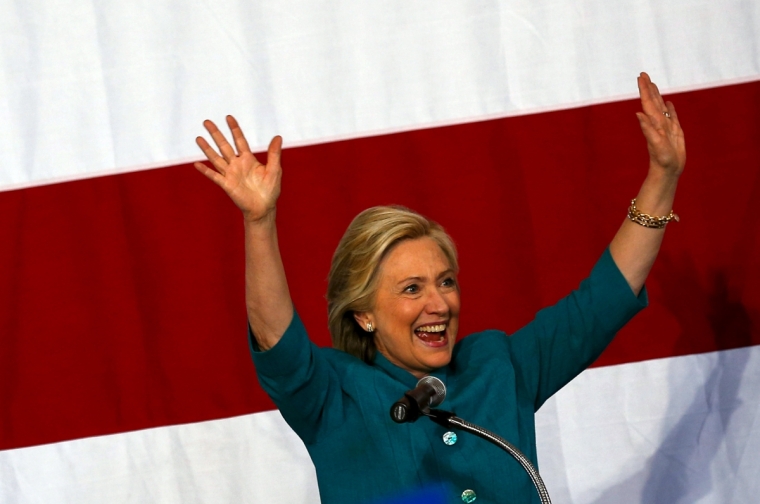Hillary: Republicans 'mean-spirited' & lack Christian compassion

DES MOINES, Iowa (Christian Examiner) – Presumptive Democrat presidential nominee Hillary Clinton said at a campaign event in Iowa Sunday her opponents were mean spirited and lacked compassion for people different from them.
Clinton, a lifelong and liberal Methodist, said she was upset by the climate of political debate and, unlike her opponents, would champion the cause of the poor in America, as well as the interests of the gay, lesbian and transgender community and immigrants – both of which she said Republicans have shunned.
Clinton, who said she learned to have compassion for the poor in Sunday School as a child, asked if her opponents did not "go and hear the same lessons I did in Sunday school? Did they not sing the same hymns? Did they not have teachers who said, 'You're no better or worse than anybody else?'"
"Did they never hear, 'There but for the grace of God go I?' Where did this mean-spiritedness come from?" Clinton asked.
This is not the first time in the campaign Clinton has talked up faith and it will likely not be the last. Late in May, CNN reported on Clinton's impromptu meeting at a bakery with a pastor who was won over by her ability to quote a particular passage of Scripture.
According to the report, Clinton asked Rev. Frederick Hunt, who had his Bible open at his table, what he was studying. When he replied that he was studying I Corinthians 13, Clinton said she knew it well and began to quote from part of it.
Clinton then told Hunt about her Methodist upbringing and said he should continue "to study and learn what the Scripture says and what it means."
"I have a preacher friend who sends me Scripture and devotionals, sometimes mini-sermons, every day," she said.
She then said the Bible is "alive," and "the living word."
As the election draws closer and Clinton begins to court moderate Christians, she will likely inject more religious language into her campaign. She did so in 2007 during her first run for the White House.
Then, the New York Times reported Clinton "increasingly spoke more personally about faith, sprinkling in references to inspiring biblical verses ('faith without works is dead,' from James), Jesus' injunction to care for the needy and even her daily prayer life, which she credits to being raised in a 'praying family.'"
The newspaper also said Clinton spoke often of experiencing "the presence of the Holy Spirit on many occasions," reading her Bible and discussing other people's "faith journeys."
Let us never believe the freedom of religion imposes on any of us some responsibility to run from our convictions. Let us instead respect one another's faiths, fight to the death to protect the right every American to practice whatever convictions he or she has, but bring our values back to the table of American discourse to heal our troubled land.
Speaking of faith, however, can be an uneasy proposition for Clinton. Late in May, Clinton jabbed at religious conservatives who hold tightly to their religious convictions on the issue of abortion. She told an audience at the Women in the World Summit that for women to have access to abortion on demand, "the deep-seated cultural codes, religious beliefs and structural biases have to be changed."
She did not elaborate on how those views should be changed.
Candidates discussing their religious viewpoints are not new to American political life. Clinton's husband, twice elected to the presidency, made religious speech and references to the Bible a hallmark of his campaign across the South in areas dominated by Christian Democrats.
His views then, however, seem to stand in stark contrast to hers regarding the need for Americans to jettison their religious convictions to accept greater access to abortion, same-sex marriage and other social changes.
Clinton has repeatedly blasted new religious freedom bills, such as those in Arkansas and Indiana, for ensconsing discrmination against homosexuals. Neither of the bills does so. Instead, they apply at the state level the wording of the federal Religious Freedom Restoration Act of 1993.
President Bill Clinton signed the RFRA in 1993. In a speech before its signing, Clinton said the act honored "the principle that our law and our institutions should not impede or hinder, but rather should protect and preserve fundamental religious liberties."
"There is a great debate aboard in the land which finds itself injected into several political races about the extent to which people of faith can seek to do God's will as political actors," Clinton said.
"I would like to come down on the side of encouraging everybody to do what they believe is the right thing to do. There are many people in this country who strenuously disagree with me on what they believe are the strongest grounds of their faith. I encourage them to speak out. I encourage all Americans to reach deep inside to try to determine what it is that drives their lives most deeply."
Clinton also noted in the same speech in 1993 that Americans were living in a country "where the most central institution of our society – the family – has been under assault for 30 years."
On Hillary Clinton's official campaign website, under the heading of "A Champion for Families," the candidate pledges to "protect the rights of LGBTQ [Lesbian, Gay, Transgender and Questioning] Americans and their families to live, learn, marry, and work free from discrimination."
No mention is made of the traditional nuclear family composed of a father, mother and children, biological or adopted.